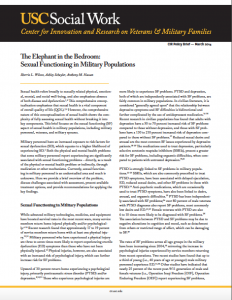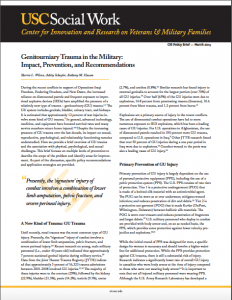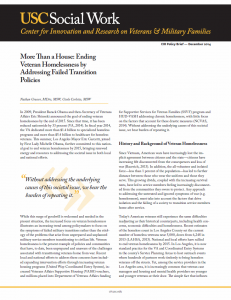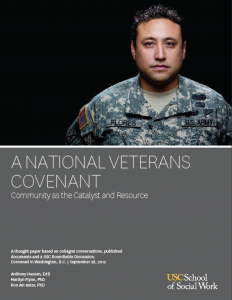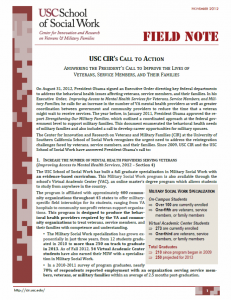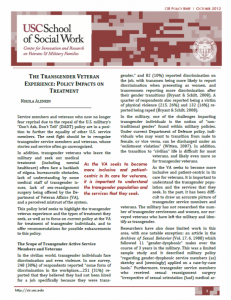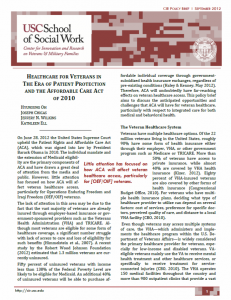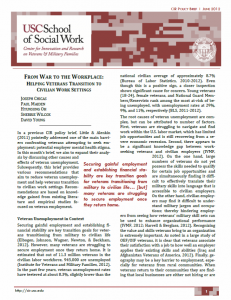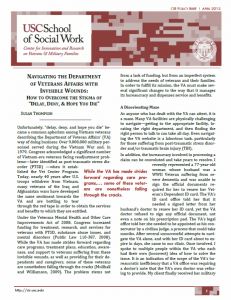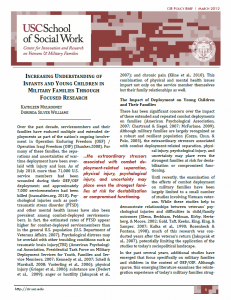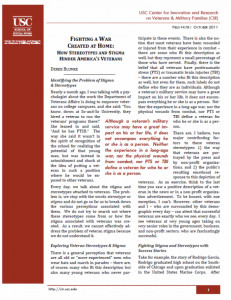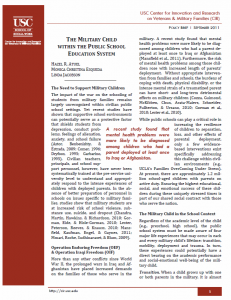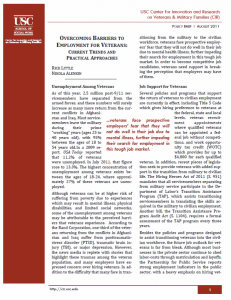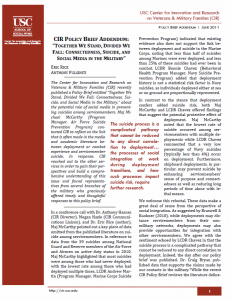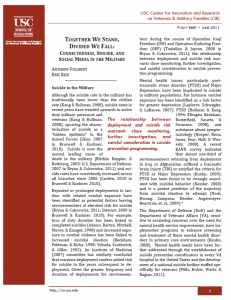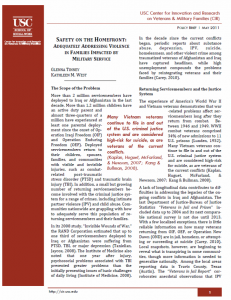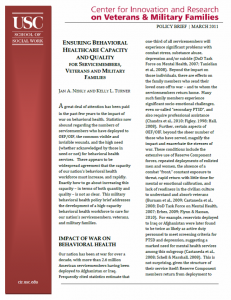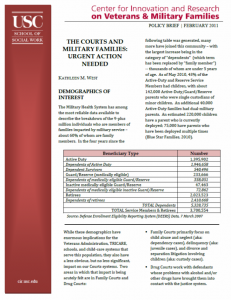The USC Center for Innovation and Research on Veterans & Military Families (CIR) draws on the expertise of USC School of Social Work faculty and other government, industry and community partners to produce actionable research and recommendations that inform the social, economic, education and policy issues impacting veterans and their families. If you are interested in writing a policy brief, review our submission guidelines and contact Claudia Bustamante at .
CIR Policy Brief Submission Guidelines
Sherrie L. Wilcox, PhD, CHES
Ashley Schuyler, MPH
Anthony M. Hassan, EdD
Sexual health refers broadly to sexually related physical, emotional, mental, and social well-being, and also emphasizes absence of both disease and dysfunction. Military personnel have an increased exposure to risk factors for sexual dysfunction (SD), which equates to a higher likelihood of experiencing it. Both the physical and mental health problems that some military personnel report experiencing are significantly associated with sexual functioning problems – directly, as a result of the physical or mental health problem or indirectly, through medication or other mechanisms. Currently, sexual functioning in military personnel is an understudied area and much is unknown. Here we provide a brief overview of the problem, discuss challenges associated with assessment, present available treatment options, and provide recommendations for applying the key findings.
Sherrie L. Wilcox, PhD, CHES
Ashley Schuyler, MPH
Anthony M. Hassan, EdD
During the recent conflicts in support of Operations Iraqi Freedom, Enduring Freedom, and New Dawn, the increased reliance on dismounted patrols and frequent exposure to improvised explosive devices (IEDs) have amplified the presence of a relatively new type of trauma – genitourinary (GU) trauma. The GU system includes genitals, bladder, urinary tract, and kidneys. It is estimated that approximately 12 percent of war injuries involve some kind of GU trauma. In general, advanced technology, medicine, and equipment have boosted survival rates and many service members return home injured. Despite the increasing presence of GU trauma over the last decade, its impact on sexual, reproductive, psychological, and relationship functioning remains understudied. Here we provide a brief overview of GU trauma and the association with physical, psychological, and sexual challenges. This brief focuses on multiple levels of prevention to describe the scope of the problem and identify areas for improvement. As part of the discussion, specific policy recommendations and application strategies are provided.
Nathan Graeser, MDiv, MSW
Gisele Corletto, MSW
In this policy brief, the authors discuss tackling the veteran homelessness problem holistically. More than providing housing, veteran policies must address the underlying causes of homelessness, which in many cases is a lack of preparation and awareness of the full spectrum of challenges associated with transitioning from military to civilian life.
This position paper provides an overview of how to develop an immediate initiative that can better meet the nation’s sacred duty to those who have served the country at times of peace and war.
In this field note, USC CIR reports on the steps that the USC School of Social Work is taking to address the urgent need for competent behavioral healthcare for veterans and military families.
Nikola Alenkin, Ph.D, LCSW
In this policy brief, the author discusses VA policy regarding transgender veterans, and the impact that this policy has on healthcare for this population.
Hyunsung Oh, MSW
Joseph Chicas, MSW
Jeffery N. Wilkins, MD
Kathleen Ell, DSW
In this policy brief, the authors discuss how the Affordable Care Act (ACA) of 2010 will affect veteran healthcare access, particularly regarding OEF/OIF veterans.
Joseph Chicas, MSW
Paul Maiden, PhD
Hyunsung Oh, MSW
Sherrie Wilcox, PhD
David Young, PhD
In this policy brief, the authors discuss how unemployment poses a significant barrier to reintegration and describe the challenge that many veterans face in translating their military skill set to the civilian workforce. They also propose recommendations to address veteran unemployment and close the gap in understanding regarding military job skills among civilian employers.
Susan Thompson, JD
In this policy brief, the author describes the difficulties that veterans with invisible wounds face in obtaining treatment or benefits from the Department of Veterans Affairs, and proposes recommendations for improving VA service to veterans and their families.
Increasing Understanding of Infants and Young Children in Military Families Through Focused Research
Kathleen Mulrooney, MA, LPC
Dorinda Silver Williams, MSW, LCSW-C
In this policy brief, the authors examine the impact of deployments on infants and young children in military families and offer recommendations for future research.
Derek Blumke
In this field note, the author examines the origins of veteran stereotypes and stigma and offers an approach to counter the inaccurate perception of veterans that many Americans share.
Hazel R. Atuel, PhD
Monica Christina Esqueda, MEd
Linda Jacobson
In this policy brief, the authors explore the particular needs of military children as well as the issues they face in the public school system. Finally, they propose some practical approaches to help alleviate the stress and challenges that these children encounter in the school environment.
Rick Little
Nikola Alenkin, PhD, LCSW
In this policy brief, the authors discuss the barriers and prejudice that veterans face when seeking employment in the civilian workforce, and explore a practical approach to solving these problems.
Anthony Fulginiti, MSW, LCSW
Eric Rice, PhD
This addendum to our most recent CIR Policy Brief, entitled “Together We Stand, Divided We Fall: Connectedness, Suicide, and Social Media in the Military,” includes feedback from several branches of the military regarding the link that is often made between deployment or combat exposure and suicide.
We are very grateful to the service representatives who contacted us and were willing to take the time and energy to clarify this issue. As always, we welcome and encourage feedback on our policy briefs–it is our intention to provoke dialogue on these issues in order to enhance our understanding of them and highlight needed changes.
Anthony Fulginiti, MSW, LCSW
Eric Rice, PhD
In this policy brief, the authors discuss the potential use of social media to encourage community and familial connectivity in order to prevent suicide among servicemembers and veterans.
Glenna Tinney, MSW, DCSW (CAPT, MSC, USN, Ret.)
Kathleen M. West, PhD
In this policy brief, the authors discuss the U.S. justice system’s need to consider the effects of combat service, traumatic brain injury (TBI), reintegration difficulties, and post traumatic stress symptoms in cases of family violence involving servicemembers, veterans, or military families.
Jan A. Nissly, PhD
Kelly L. Turner, PhD
In this policy brief, the authors discuss the development of a high-capacity behavioral health workforce to care for our nation’s servicemembers, veterans, and military families. Topics include the impact of war on behavioral health, the strain on traditional service systems, and current responses to increasing capacity. Recommendations for ways to maximize progress in behavioral healthcare capacity and quality are also offered.
In this policy brief, the author discusses the ways in which Family and Drug Courts have been impacted by the recent influx of children from families with members in military service.


